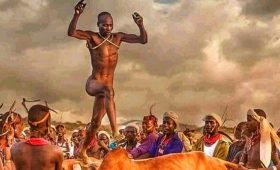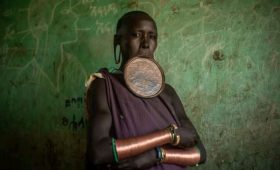A Warrior’s Rite of Passage Shared by Two Tribes
Deep in the Omo Valley and surrounding regions of southwest Ethiopia, Donga stick fighting remains one of the most powerful living traditions among two of the region’s most culturally rich communities: the Suri (Surma) and Mursi tribes.
This ritual combat—fought with long wooden staffs—goes far beyond sport. It is a respected rite of passage, a test of strength and character, and an expression of tribal pride, courage, and masculine identity.
Both the Suri and Mursi peoples share more than 95% of their cultural heritage, including customs, language roots, body decoration, and social structures—making Donga a common, deeply symbolic thread woven into both communities.
What Is Donga?
Donga is a ceremonial form of stick fighting where two young men face off in front of their tribe, armed only with long hardwood poles. Matches are intense, often bloody, but governed by unwritten rules of honor and respect.
The objective is to show strength, bravery, and endurance, not to cause serious injury. Fighters wear minimal clothing and often decorate their bodies with ash or ochre, creating a striking visual scene full of movement, rhythm, and tension.
Cultural Importance
For both the Suri and Mursi, Donga carries deep cultural and symbolic meaning:
• It’s a rite of manhood, where boys prove they’re ready to be seen as adult men.
• It can be a way to win the attention of potential brides or gain prestige in the community.
•It reinforces tribal unity and gives the community a moment to celebrate tradition, music, and youth.
Donga matches are often part of larger seasonal gatherings, especially after harvest or during local celebrations organized by elders.
When and Where to See It
Donga doesn’t follow a fixed calendar—it happens only when announced by tribal elders, typically between August and December, after the harvest season. The events may be held in remote villages in the Suri heartland (Kibish, Tulgit) or Mursi territory inside Mago National Park.
Because the ceremonies are only confirmed a few days in advance, it’s impossible to schedule Donga in a fixed itinerary—but Omo Region Tours works closely with tribal guides and elders to give guests the best possible chance to attend.
What to Expect as a Visitor
• Crowds gather around a makeshift ring, singing and dancing while the fighters prepare.
•Participants engage in multiple rounds, and community elders monitor for fairness and safety.
•You may see chanting women encouraging the fighters, and spectators shouting with excitement as blows land.
• The mood is celebratory yet respectful—it’s a spiritual and social experience for everyone present.
Photography may be allowed, but always ask your local guide first and maintain cultural sensitivity.
Experience Donga with Omo Region Tours
As a locally based operator in the Omo Valley, we are uniquely positioned to offer access to remote tribal events like Donga. While it cannot be guaranteed, we’ll let you know immediately if a ceremony is announced during your stay. If it’s confirmed, you can choose to add it to your itinerary with a small community fee that supports the tribe directly.
Book authentic Omo Valley Tours with Tripadvisor’s best local operator, and gain immersive access to rare events like the Donga stick fighting ceremony—guided with knowledge, respect, and cultural responsibility.
Final Thoughts
Donga is not just a tribal competition—it is a cultural heartbeat of two of Africa’s most resilient communities. For the Suri and Mursi, it’s a living legacy passed from one generation to the next. For visitors, witnessing Donga offers an unforgettable encounter with authentic indigenous Africa—a moment of raw power, ancestral pride, and human connection.
Contact Omo Region Tours today to plan your journey into the wild heart of Ethiopia’s Omo Valley and explore the rare traditions that still shape life in one of the most culturally vibrant regions on earth.




